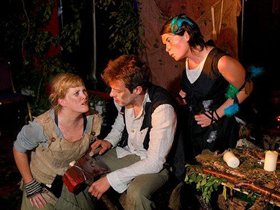If you’ve ever wondered how the parents of Hansel and Gretel coped after abandoning their children in the woods, before the wicked step-mother died and the children returned for the happy-ever after, John Chambers’ The Gingerbread House, takes you into their den of domestic hell and tries to show you what lack of conscience and weakness of will can do to the soul.
 His ambition is, I suppose, a fine one; to take a classic fairytale and deconstruct it to enlighten on parental responsibility, the consequences of neglecting this responsibility and the traumatic fatalistic horror of a bad marriage challenged by economic want. However, though competent in language, deploying through his cast beautiful haunting descriptions of the woods and its creatures, Chambers fails to inject his play with any sort of dramatic device to hold an audience for eighty minutes. The endless circle of bickering and blaming between the husband and wife all becomes tedious and no amount of poetic language lifts the story out of an abyss of repetitive drama that never moves the action forward. The message inherent in the play about the consequences of neglect for both the neglecters and the neglected is driven so far home in the dialogue, that you are left wondering if the writer thinks the audience needs neon signposting.
His ambition is, I suppose, a fine one; to take a classic fairytale and deconstruct it to enlighten on parental responsibility, the consequences of neglecting this responsibility and the traumatic fatalistic horror of a bad marriage challenged by economic want. However, though competent in language, deploying through his cast beautiful haunting descriptions of the woods and its creatures, Chambers fails to inject his play with any sort of dramatic device to hold an audience for eighty minutes. The endless circle of bickering and blaming between the husband and wife all becomes tedious and no amount of poetic language lifts the story out of an abyss of repetitive drama that never moves the action forward. The message inherent in the play about the consequences of neglect for both the neglecters and the neglected is driven so far home in the dialogue, that you are left wondering if the writer thinks the audience needs neon signposting.
The story has been updated elsewhere to modern times but this 'Hansel and Gretel' retelling retains the poor woodcutter and his wicked wife in the woods on a very good stage set by Jos Clarke. The design of an eerie cottage interior, furnished with logs and a weakly smouldering fire, surrounded by the wood is 'Hansel and Gretel' as we imagine it, while Mike O’Halloran’s subtle and shady lighting complements the dreary atmosphere of life in a poor woodcutter’s home.
The 'Hansel and Gretel' theme is certainly universal and transcends time, but if you are to innervate a fairy tale and leave it in its time, then you really need to find a device that will talk to an audience. Chambers just didn’t find that nugget. The blame is all in the writing. Cast and director did the best they could with material that is laborious, angry, aimless and even pretentious. The play opens with the sharp tongued wife telling us about the “non murder,” of the children, the “non killing.” This kind of language refers us to the avoidance of responsibility and the things people will tell themselves to avoid owning up to the harsh truths of their actions. But this is hardly clever dialogue and easy to see through.
Director Rebecca Ryan rather had her work cut out for her in fashioning this story to the stage, but she cannot be faulted for much other than choosing to take on the challenge in the first place. She and the small cast of three who interchange roles with aplomb give their best to the performances. Tracy Bruen doubles as wife and Gretel and is particularly superb in her transfer from harridan to innocent child. She expertly inhabits the skin of a bitter woman in expression and demeanour and when she metamorphoses into Gretel her achievement of the role is excellent. Rebecca Ryan’s costumes of sack cloth and worn rags are admirably apt.
A lot of great effort on stage but alas this reviewer found the storytelling and drama undeserving of the toil.
Breda Shannon is a freelance writer and reviews books for The Irish Examiner.